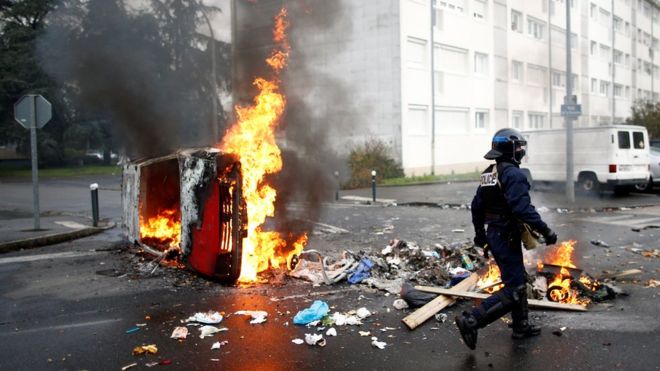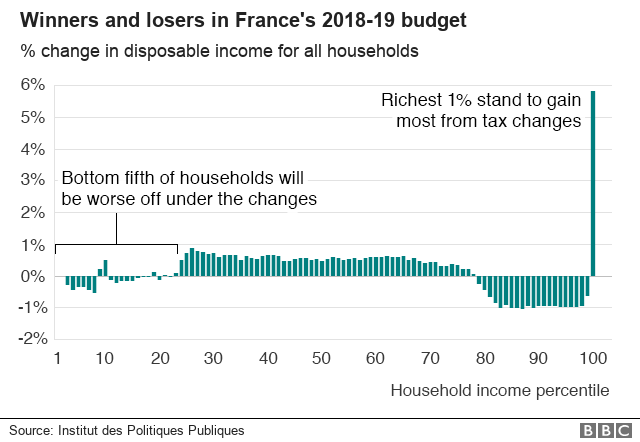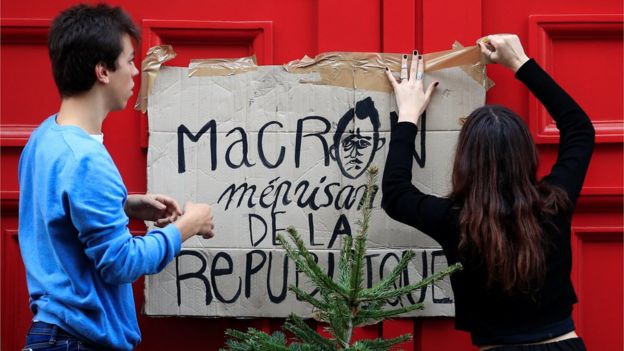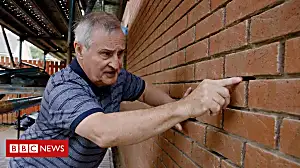 REUTERS
REUTERS
The French government says it fears "major violence" in Paris on Saturday as the national "yellow vests" protest movement shows little sign of easing.
The government said it was scrapping fuel tax increases in the budget - the original spark for the protests.
But the movement has since grown into a wider expression of anger about rising living costs, and Saturday's planned rally looks set to go ahead.
Recent protests have turned violent, causing millions of euros in damage.
The government appealed for calm after making its political concessions - but on Thursday, protests continued in pockets around France as discontent spread beyond the core movement.
What is the government worried about?
The protest on Saturday 1 December descended into the worst rioting seen in decades, with hundreds of injuries and arrests.
Many protesters are law-abiding French citizens, engaged in a street protest that has huge public support and is widely seen as a legitimate democratic action.
However, without any central structure or official leaders, extremists and "troublemakers" are suspected of joining the rallies and inciting violence, the interior minister said earlier this week.
Sources at the presidential palace expressed the government's concern about continued violence on Wednesday night.
French health minister Agnès Buzyn, speaking to RTL Radio on Thursday morning, said: "There is a concern about this violence, and some who do not want to find a solution."
The government is considering mobilising the military to protect important national monuments, French broadcaster BFMTV reported, after the world-famous Arc de Triomphe was damaged last week.
How are the protests spreading?
The yellow vests protests have moved beyond the initial anger about fuel taxes. Last week, the movement - despite a lack of central leadership - issued more than 40 demands to government.
Among them were a minimum pension, widespread changes to the tax system, and a reduction in the retirement age.
The government has already acknowledged some of the concerns, suggesting it may review the "wealth tax" it abolished after taking power.
An analysis of its original budget plans for 2018-2019 showed it benefited the very wealthy rather than the very poor.

Other groups, bolstered by the success of the national movement, have also begun separate actions.
One police union, Vigi, called for a strike of its administrative staff working in the interior ministry for Saturday - saying that without the support of such staff, riot police would be immobilised.
"Our hierarchy still sends us to take a beating instead of the government," the union said, calling for solidarity with the yellow vests.
Two road transport unions, the CGT and FO, have called for a strike among its 700,000 members on Sunday, Le Monde reported. Drivers have been affected by changes to overtime payments, the unions say, which affect the purchasing power of its members.
What are the student protests about?
Thursday saw young people take to the streets, protesting over educational reforms.
President Macron's government hopes to change the end-of-school exam, known as the baccalaureate, which is required for entrance to university.
It was brought in under Napoleon more than 200 years ago, and any passing student is entitled to attend their local university - where a large number do not complete their first year.
Mr Macron's plan could allow universities to select students on merit for the most popular courses - but critics fear that will limit opportunity and breed inequality.
 REUTERS
REUTERS
In Nantes, young demonstrators overturned vehicles and bins, and set fires, while 146 people were arrested in Mantes-la-Jolie, Yvelines, after clashes with police in front of a school.
On Wednesday, similar demonstrations in Bordeaux and Toulouse led to arrests. But most of the protests have been peaceful.
Hundreds of schools were blockaded this week, but the young participants did not wear the distinctive yellow vests of the wider protest movement.
French daily Le Monde, however, drew a line between the two groups, suggesting that long-standing discontent over the proposed education reforms had been given a boost by the success of the "yellow vests".
The Union Nationale Lycéenne, representing secondary school students, has called for a "great mobilisation" of schools on Friday.
Separately, older students at the famous Sorbonne university have faced disruption amid anger at government plans to charge non-EU students extra tuition fees.
The controversy led to a blockade of some university sites on Wednesday.
France 3 reported that the historic campus, called Sorbonne 1, was closed on Thursday for security reasons after some young people attempted to enter the building.
Another part of the university, Sorbonne Nouvelle - known as Paris 3 - also remains closed.
Europe
Girl's 'hijacked' invite sparks riot fears
- 1 hour ago
- Europe
UK MPs to debate economic impact of Brexit
- 1 hour ago
- UK Politics
- 2063












No comments:
Post a Comment